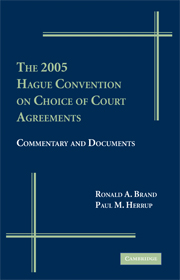Book contents
- Frontmatter
- Contents
- Preface
- PART I A BASIC INTRODUCTION TO THE 2005 HAGUE CHOICE OF COURT CONVENTION
- PART II ARTICLE-BY-ARTICLE COMMENTARY ON THE CONVENTION
- PART III CHOICE OF COURT IN THE ABSENCE OF A MULTILATERAL CONVENTION
- 9 Treatment of Choice of Court Clauses in U.S. Courts
- 10 Recognition and Enforcement of Judgments in the United States: With and Without Choice of Court Agreements
- PART IV LITIGATION AND ARBITRATION CHOICES AFTER THE HAGUE CONVENTION
- Appendix A Explanatory Report by Trevor Hartley & Masato Dogauchi (including the text of the 2005 Hague Convention on Choice of Court Agreements)
- Appendix B Cited Excerpts from the Nygh-Pocar Report
- Index
9 - Treatment of Choice of Court Clauses in U.S. Courts
from PART III - CHOICE OF COURT IN THE ABSENCE OF A MULTILATERAL CONVENTION
Published online by Cambridge University Press: 26 October 2009
- Frontmatter
- Contents
- Preface
- PART I A BASIC INTRODUCTION TO THE 2005 HAGUE CHOICE OF COURT CONVENTION
- PART II ARTICLE-BY-ARTICLE COMMENTARY ON THE CONVENTION
- PART III CHOICE OF COURT IN THE ABSENCE OF A MULTILATERAL CONVENTION
- 9 Treatment of Choice of Court Clauses in U.S. Courts
- 10 Recognition and Enforcement of Judgments in the United States: With and Without Choice of Court Agreements
- PART IV LITIGATION AND ARBITRATION CHOICES AFTER THE HAGUE CONVENTION
- Appendix A Explanatory Report by Trevor Hartley & Masato Dogauchi (including the text of the 2005 Hague Convention on Choice of Court Agreements)
- Appendix B Cited Excerpts from the Nygh-Pocar Report
- Index
Summary
FROM OUTCAST TO ACCEPTED PRACTICE
Until the second half of the twentieth century, courts in the United States generally did not look favorably on clauses in private contracts that might lead to dispute resolution in another forum. It was common doctrine that “agreements in advance of controversy whose object is to oust the jurisdiction of the courts are contrary to public policy and will not be enforced.” This doctrine stood on the dual rationale that parties could not privately agree to alter the jurisdiction of courts and that contractual stipulations to limit judicial jurisdiction were against public policy.
Focusing on the distinction between prorogated jurisdiction and derogated jurisdiction, courts traditionally looked more favorably on being the selected court than on being the rejected court. This view tended to suggest that private parties using choice of court agreements were granting or removing jurisdiction from specific courts. Such an analysis obviously conflicted with basic American concepts of judicial power. An alternative analysis suggested that “[t]he real issue…is not whether the parties can by agreement ‘confer’ or ‘oust’ jurisdiction, but whether the selected or ousted court will exercise its own jurisdiction in such a way as to give effect to the intention of the parties.”
THE BREMEN STANDARD
The idea that choice of court agreements do not affect the existence of jurisdiction but rather only the propriety of the exercise of that jurisdiction was further developed by the U.S. Supreme Court when it squarely addressed the matter in 1972 in M/S Bremen and Unterweser Reederei, GmbH v. Zapata Off-Shore Co.
- Type
- Chapter
- Information
- The 2005 Hague Convention on Choice of Court AgreementsCommentary and Documents, pp. 185 - 191Publisher: Cambridge University PressPrint publication year: 2008



